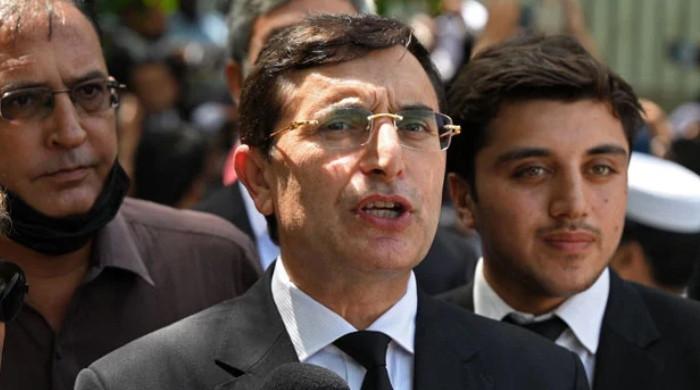Axact executive could face 20 years in US prison over fake degree scam
Hamid was presented in a Manhattan federal court over charges of wire fraud, conspiracy to commit wire fraud, and aggravated identity theft in connection with Axact scam
December 23, 2016
Axact executive Umair Hamid, who was charged in a US federal court on Wednesday for his part in an alleged $140 million 'fake diploma mill' scheme, could face up to 20 years in prison.
In the latest in a global crackdown touched off by arrests in Pakistan last year, Hamid, 30, was arrested on Monday and presented in a federal court in Manhattan over charges of wire fraud, conspiracy to commit wire fraud and aggravated identity theft in connection with a scam that impacted tens of thousands of consumers.
In May 2015, Axact had come under microscopic scrutiny when The New York Times’ investigative journalist Declan Walsh broke a scandal shining light on the company’s notorious business of fake degrees. Hamid, who had joined Axact in 2006 as an assistant executive, also came under investigation.
Hamid, however, after making some startling confessions, had escaped imprisonment in Pakistan by volunteering as a prosecution witness.
Story behind Hamid’s arrest in US
In a series of tweets, Declan Walsh detailed how Hamid was arrested by US authorities earlier this week.
According to the journalist, Hamid travelled to the US in September this year to open new bank accounts for fake universities. He stayed at Bellagio casino resort in Las Vegas.
Hamid was arrested following a sting operation by US Postal Inspection Service. The sting operation was conducted through a cooperating witness who sold two fake degree websites to Axact in 2014. The witness cooperated in return for reduced sentence.
The sting operation started in September when Hamid tried to re-establish Axact operations in the US – one month after Axact CEO Shoaib Shaikh was released on bail.
Hamid reportedly told the witness that, at its height, Axact was getting 5,000 calls from prospective customers every day.
1) Fascinating story behind arrest of Axact executive Umair Hamid in the US, following sting operation by US Postal Inspection Service
— Declan Walsh (@declanwalsh) December 22, 2016
2) Sting conducted thru cooperating witness who sold two fake degree websites to Axact in 2014. Cooperated in return for reduced sentence.
— Declan Walsh (@declanwalsh) December 22, 2016
3) Sting started in Sept when Hamid tried to re-establish Axact ops in the US — one month after Axact CEO Shoaib Shaikh released on bail.
— Declan Walsh (@declanwalsh) December 22, 2016
6) Hamid travelled to the US in September to open new bank accounts for fake universities. Stayed at Bellagio casino resort in Las Vegas.
— Declan Walsh (@declanwalsh) December 22, 2016
According to Manhattan US Attorney Preet Bharara, Hamid resumed selling fake diplomas, duping US consumers into paying upfront fees to enroll in fake high schools and colleges even after Pakistani authorities shut Axact down in May 2015.
Hamid’s role in the Axact scheme
Hamid, going by the aliases “Shah Khan” and the “Shah,” served as Axact’s “Assistant Vice President of International Relations.” According to the Justice Department’s press release, he was involved in managing and operating online companies that falsely posed to consumers as legitimate educational institutions. Hamid allegedly made various false and fraudulent representations to consumers in order to sell fake diplomas.
Peon taught to 'lip sync' answers via Skype to deceive US court
An Axact peon told Pakistan's FIA in 2015 that Umair Hamid and Shoaib Shaikh taught him to 'lip sync' answers via Skype to deceive a US court. The Axact management had fooled a US court when representing websites (Belford High School and Belford University) declared fake by the District Court of Michigan.
A video statement was recorded from Axact’s Karachi office through the company’s peon, Saleem Qureshi, who was portrayed as a defendant in the lawsuit against these websites. However, he was under instruction to only keep his lips in motion by uttering 1,2,3,4 in silence while Umair Hamid and Shoaib Shaikh stood next to him and recorded the statement, without raising suspicion in the minds of the American judge and plaintiff that another fraud was being committed, Qureshi’s confessional statement before a Karachi court revealed.
Case proceedings in Pakistan halted
Following The New York Times report, Pakistani authorities had sprung to action. FIA and other law enforcement agencies had cracked down on Axact and closed its offices countrywide.
Despite the initial swift action, however, the case proceedings faced numerous delays and obstacles.
Four prosecutors, one after the other, dissociated themselves from the case for reasons unknown to this day.
Barrister Zahid Jamil, a top investigator of FIA, tried to get on the case again but his house in Karachi was attacked with a hand grenade by ‘unknown assailants’.
Despite assurances by Interior Minister Chaudhry Nisar that the case would be taken to its logical conclusion, evidence collection work in the courts remains halted since October 2015.











